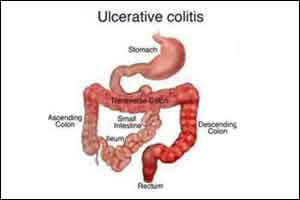- Home
- Editorial
- News
- Practice Guidelines
- Anesthesiology Guidelines
- Cancer Guidelines
- Cardiac Sciences Guidelines
- Critical Care Guidelines
- Dentistry Guidelines
- Dermatology Guidelines
- Diabetes and Endo Guidelines
- Diagnostics Guidelines
- ENT Guidelines
- Featured Practice Guidelines
- Gastroenterology Guidelines
- Geriatrics Guidelines
- Medicine Guidelines
- Nephrology Guidelines
- Neurosciences Guidelines
- Obs and Gynae Guidelines
- Ophthalmology Guidelines
- Orthopaedics Guidelines
- Paediatrics Guidelines
- Psychiatry Guidelines
- Pulmonology Guidelines
- Radiology Guidelines
- Surgery Guidelines
- Urology Guidelines
Ulcerative colitis patients at increased risk for depression, anxiety

USA: Patients with ulcerative colitis (UC) are more likely to suffer from psychiatric illness -- depression, anxiety, and bipolar disorder compared with their non-UC counterparts, a recent study has found. The prevalence (of psychiatric illness) in UC was more common in elderly, females, and Caucasians.
The study was presented at the American College of Gastroenterology’s Annual Scientific Meeting (ACG 2019) in San Antonio, Texas.
According to Mayo Clinic, ulcerative colitis is an inflammatory bowel disease (IBD) that causes long-lasting inflammation and ulcers (sores) in the digestive tract. UC affects the innermost lining of your large intestine (colon) and rectum.
Studies have shown the patients of UC to be at increased risk for developing psychiatric illnesses. However, these studies have been limited by small sample size. Vijit Chouhan, University Hospitals Cleveland Medical Center, Cleveland, OH, and colleagues aimed to describe the epidemiology of psychiatric illness in UC through the utilization of a large sample population.
For the purpose, the researchers queried a commercial database -- an aggregate of electronic health record data from 26 major integrated US healthcare systems. An aggregated patient cohort of eligible patients with UC diagnosis and depression, anxiety, and bipolar disorder between 2014 and 2019 based on the Systematized Nomenclature of Medicine-Clinical Terms (SNOMED-CT) were identified. patients with a diagnosis of depression, anxiety, or bipolar disorder without UC were also identified. Univariate analyses were performed to identify risk factors for psychiatric illness in UC.
Key findings of the study include:
- Of the total number of patients in the database with UC, 22,780 had depression, 28,480 had anxiety, and 5,140 had bipolar disorder, with prevalences of 17%, 23%, and 4%, respectively.
- Depression, anxiety, and bipolar disorder in UC were more prevalent than in individuals without UC.
- Within UC, psychiatric illness was more prevalent in elderly (age >65 years old), females, and Caucasians.
- Compared to patients with psychiatric illness without UC, patients with psychiatric illness and UC were more likely to have a history of alcohol abuse, tobacco use, substance use, personality disorder, and corticosteroid use.
“This is one of the largest studies to date to describe the epidemiology of psychiatric illness in UC," wrote the authors.
“Psychiatric illness is under-recognized in UC and should be screened for and treated accordingly," they concluded.
The study "Epidemiology of Major Depressive Disorder, Anxiety Disorder, and Bipolar Disorder in Ulcerative Colitis in the United States Between 2014 and 2019: A Population-Based National Study" was presented October 27, 2019, at the American College of Gastroenterology Annual Scientific Meeting (ACG 2019) in San Antonio, Texas.

Disclaimer: This site is primarily intended for healthcare professionals. Any content/information on this website does not replace the advice of medical and/or health professionals and should not be construed as medical/diagnostic advice/endorsement or prescription. Use of this site is subject to our terms of use, privacy policy, advertisement policy. © 2020 Minerva Medical Treatment Pvt Ltd